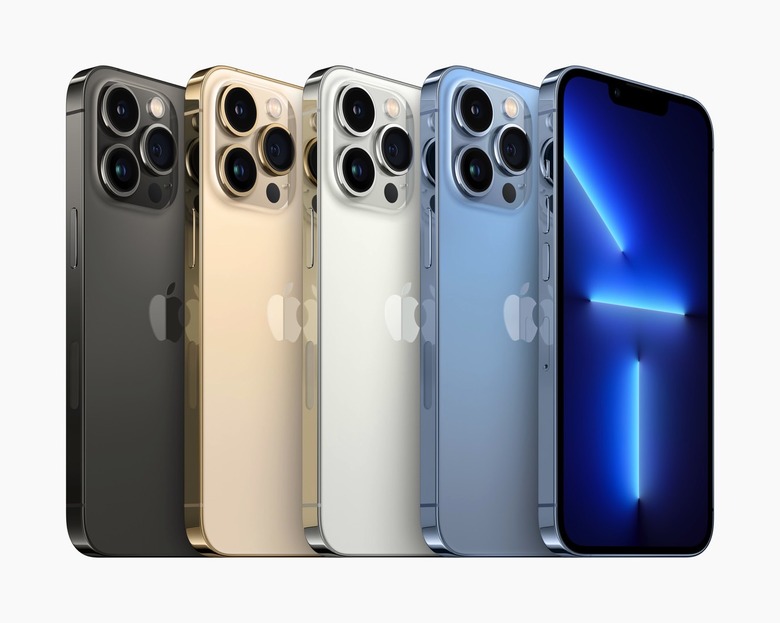Early iPhone 13 Pro Benchmarks Destroy Every Android Phone
"Frankly, the competition is still playing catch-up to our chips, not just from last year, but even from two years ago," said Apple's Kainn Drance when discussing the iPhone 13's performance at this week's event. "And today, we're extending our lead with A15 Bionic." Apple addressed the A15 Bionic performance in various segments of the show, since the chip powers five different devices. The iPad mini 6, iPhone 13 mini, iPhone 13, iPhone 13 Pro, and iPhone 13 Pro Max all run on versions of the A15 Bionic. And now the first iPhone 13 Pro benchmarks have leaked, showing how much of a lead Apple has over the competition.
A15 Bionic performance: ‘Despair’ for Android
The A15 chips aren't exactly identical. The SoC in the iPhone 13 Pros and the iPad mini features a 5-core GPU compared to the 4-core GPUs for cheaper iPhone 13 models. Graphics performance aside, all A15 versions pack the same 6-core CPU that we've come to expect from Apple's chipsets. And we know that the iPhone 13 Pro models ship with 6GB of RAM, compared to just 4GB of RAM on the regular iPhone 13 and the 13 mini.
This brings us to Ice Universe's tweet below that features the first Geekbench 5 scores for the iPhone 13's A15 Bionic.
Apple A15 Geekbench score, only one word left to Android: despair. pic.twitter.com/luxuWmUZlZ
— Ice Universe (@UniverseIce) September 16, 2021
The insider says there's "only one word left to Android: despair." That's an interesting remark considering it's coming from a dedicated Samsung fan. Anyone following "Ice" knows he's been critical of Samsung time and again while comparing the Korean giant's phones to other Android devices from China. That's to say that the leaker is more than familiar with Android handsets and their performance.
Why iPhone vs. Android speed comparisons matter
Benchmarks alone will never tell the complete story of a device's performance. And most buyers don't care about these figures. So what if the iPhone 13 clocks over 1700 points in single-core tests and over 4800 points in multi-core tests? But the tests show Apple is still leading the pack, by far. This sort of performance will ensure that the iPhone 13 buyers have devices that will last for years down the road.
Someone buying an iPhone 13 right now might very well end up using it for many years without noticing performance issues. They'll also continue to get iOS updates for a very long time. For example, the iPhone 6s from all the way back in 2015 is about to receive Apple's iOS 15 update on Monday, September 20th. That's six years since the phone was first released! The same definitely can't be said for Android devices.
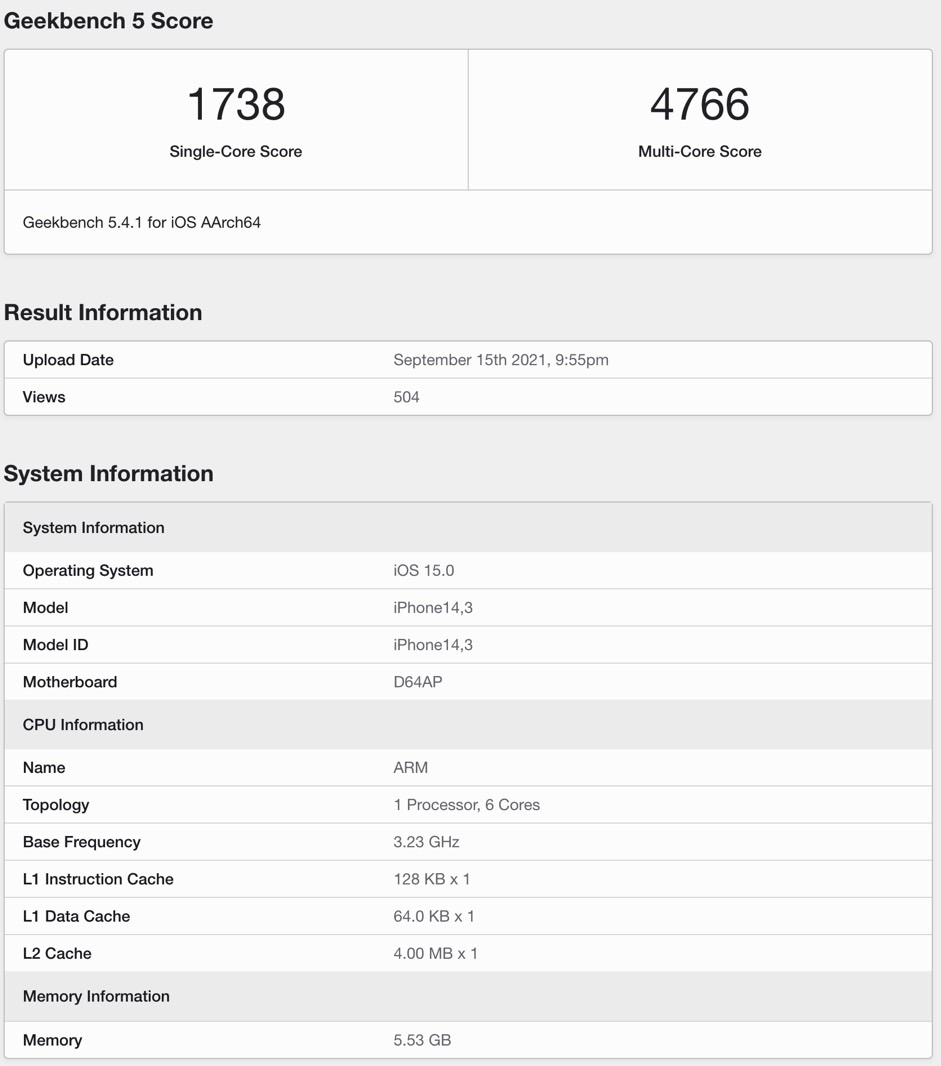
Early iPhone 13 Pro Geekbench 5 benchmark scores.
The Geekbench 5 listing for the iPhone 13 reveals that we're looking at a Pro model. It's unclear whether it's the iPhone 13 Pro or Pro Max, but the listing tells us the handset has 6GB of RAM. As seen above, this iPhone 13 Pro version clocks at 3.23GHz, which is a significant upgrade over the iPhone 12 Pro Max's top speed of 2.99GHz (as seen below).
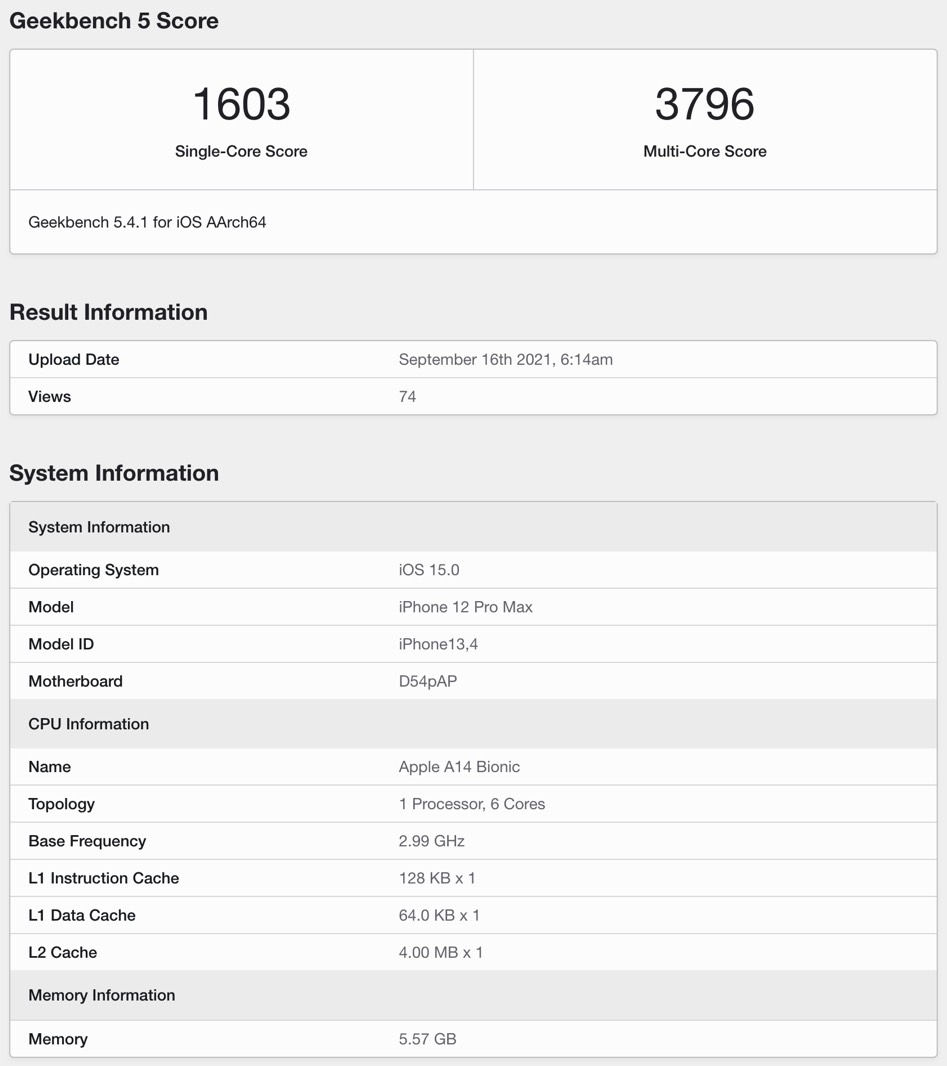
iPhone 12 Pro Max Geekbench 5 benchmark scores.
iPhone 13 benchmark comparisons
Things get interesting if we compare the iPhone 13 Po to the older iPhones that Apple still sells, and the best Android alternatives available in stores right now.
iPhone 12 Pro Max vs. iPhone 13 Pro
We'll start with the obvious iPhone vs. iPhone comparisons. The iPhone 13 and iPhone 12 phones both feature 5nm chips. But the A15 Bionic is built on a superior TSMC process. The scores below show that the A15 Bionic shines in multi-core performance compared with the A14 Bionic.
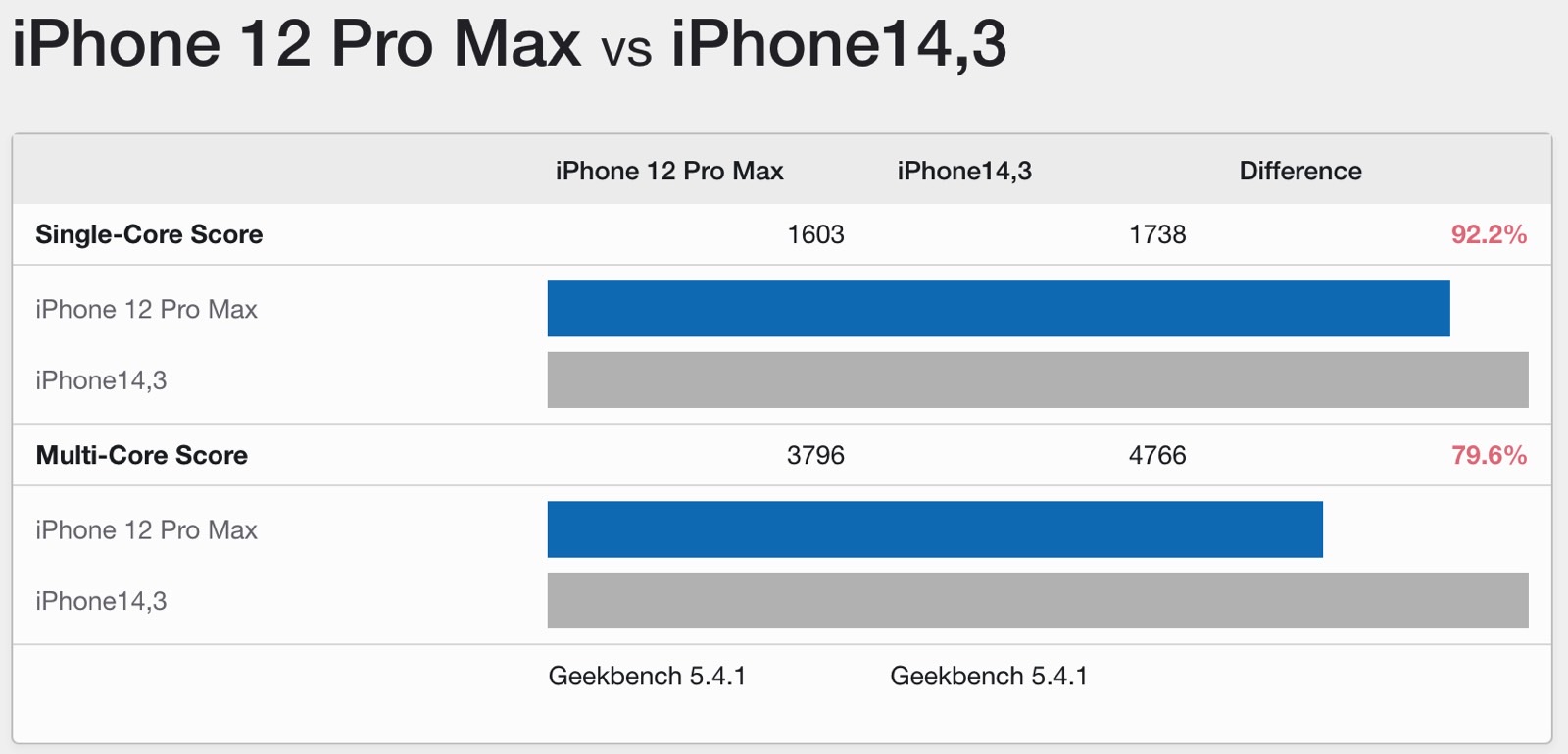
iPhone 12 Pro Max vs. iPhone 13 Pro Geekbench 5 benchmark scores.
iPhone 11 vs. iPhone 13 Pro
Apple still sells the iPhone 11, which is a steal at $499. Anyone looking for a cheap iPhone should definitely check out the iPhone 11 before looking at a used device. The iPhone 11 runs on the iPhone 13 Bionic chip, built on a 7nm process. The same chip powers the 2nd-gen iPhone SE, so performance will be similar between the two devices.
The benchmark comparison below should help current iPhone 11 owners whether or not they should upgrade. But the numbers paint a clear picture. The iPhone 13 Pro will deliver massive speed gains over the 2019 handset.
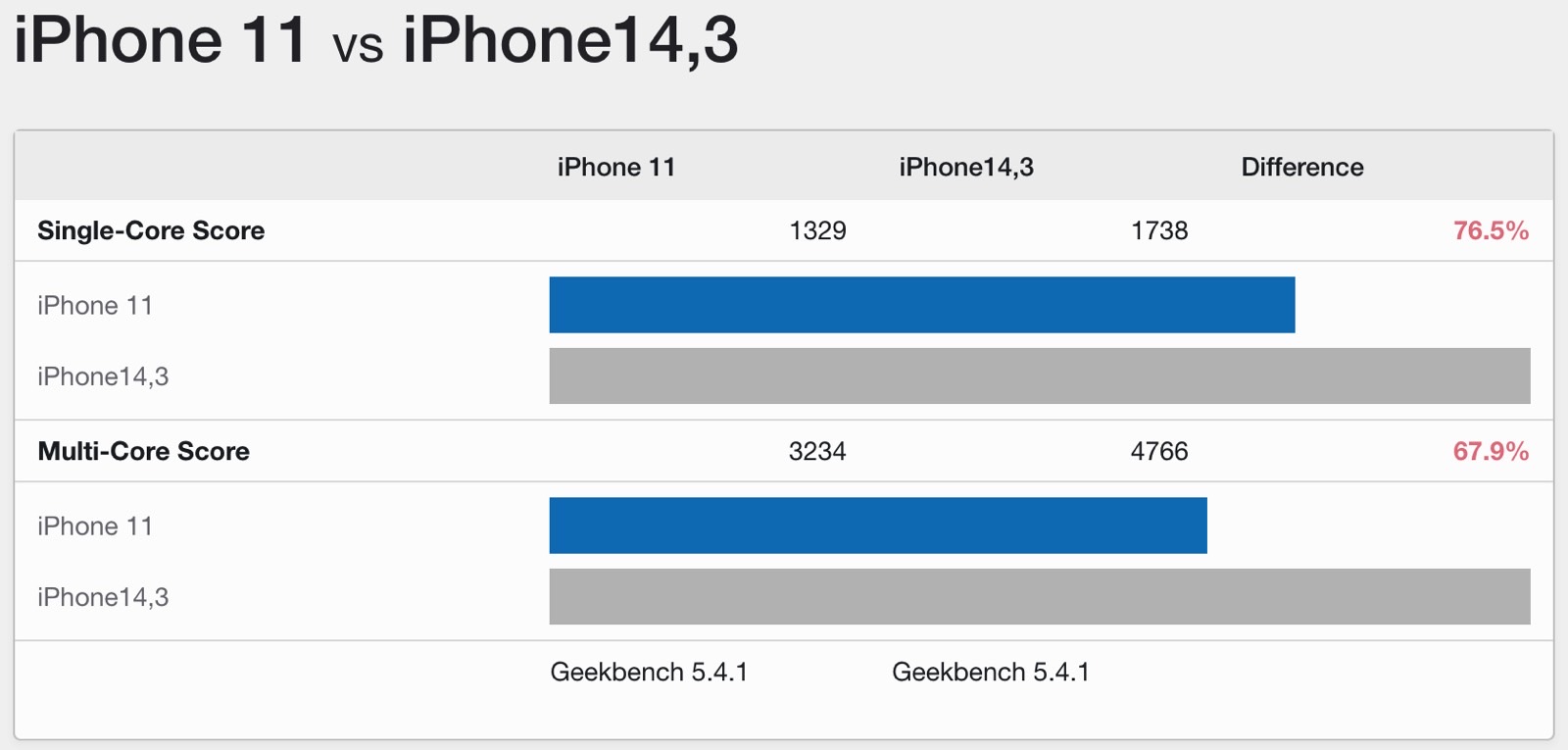
iPhone 11 vs. iPhone 13 Pro Geekbench 5 benchmark scores.
Galaxy S21 Ultra vs. iPhone 13 Pro
Apple said during the iPhone 13 event that Android handsets are still playing catch-up to two-year-old A-series chips. The Geekbench 5 benchmark comparison below shows precisely how fast the iPhone 13 Pro is compared to this year's top-of-the-line Galaxy S21 handset. The Ultra variant is the best Galaxy S21 version you can find in stores. The phone packs the Snapdragon 888 SoC that powers multiple 2021 Android flagships.
Needless to say, the iPhone 13 Pro crushes Samsung's flagship from the same year. But it gets even worse. This test also shows that the Galaxy S21 Ultra scores lower than the 2019 iPhone 11 in the same Geekbench test.
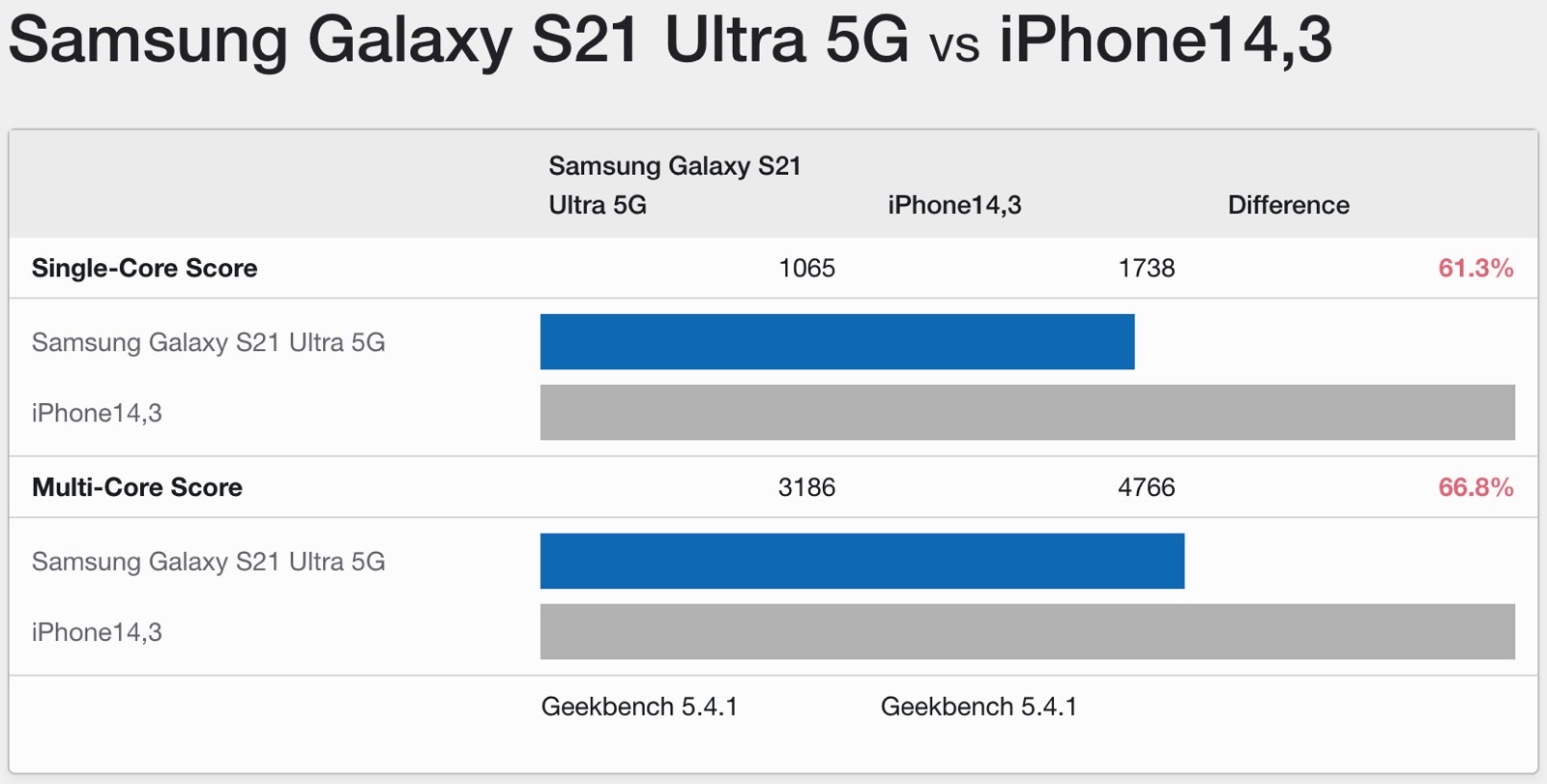
Galaxy S21 Ultra vs. iPhone 13 Pro Geekbench 5 benchmark scores.
Pixel 5 vs. iPhone 13 Pro
This should never be a contest, but we're putting it up here nonetheless. Google chose last year to equip a mid-range Qualcomm chip inside the flagship Pixel phones. The Pixel 5 device is the best Google phone you can buy right now. It competes directly against the iPhone and Galaxy S21.
The iPhone 13 Pro obliterates the Pixel 5, obviously. There's no comparison between the two. Thankfully, Google is making its own SoC for the Pixel 6, so we will soon forget benchmark comparisons like the one below.
Pixel 5 vs. iPhone 13 Pro Geekbench 5 benchmark scores.
